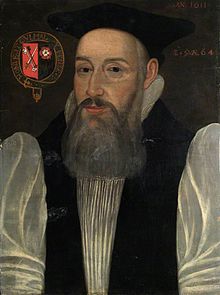Thomas Bilson
|
The Right Reverend and Right Honourable Thomas Bilson |
|
|---|---|
| Lord Bishop of Winchester | |
 |
|
| Province | Church of England |
| See | Winchester |
| Installed | 1597 |
| Term ended | 1616 |
| Predecessor | William Day |
| Successor | James Montague |
| Other posts | Bishop of Worcester (1596–1597) |
| Personal details | |
| Born | 1547 Winchester, England |
| Died | 18 June 1616 |
Thomas Bilson (1547 – 18 June 1616) was an Anglican Bishop of Worcester and Bishop of Winchester. With Miles Smith, he oversaw the final edit and printing of the King James Bible. He is buried in Westminster Abbey in plot 232 between the tombs of Richard the Second and Edward the Third. On top of his gravestone there is a small rectangular blank brass plate — the original plate was removed in order to preserve it and is on display on the floor against the wall between the tombs of Richard ll and Edward lll and says the following:—
MEORIAE SACRVM / HIC IACET THOMAS BILSON WINTONIENSIS NVPER EPISCOPVS / ET SERENISSIMO PRINCIPI IACOBO MAGNAE BRITTANIAE REGI /POTENTISSIMO A SANCTIORIBVS CONSILIJS QVI QVVM DEO ET / ECCLESIAE AD ANNOS VNDE VIGINTI FIDELITER IN EPISCO / PATV DESERVISSET MORTALITATE SUB CERTA SPE RESVRRECTI: /ONIS EXVIT DECIMO OCTAVO DIE MENSIS IVNIJ ANO DOMINI /M.DC XVI. AETATIS SVAE LXIX.
Translation:— Here lies Thomas Bilson formerly bishop of Winchester and counsellor in sacred matters of his serene highness King James of Great Britain who when he had served God and the church for nineteen years in the bishopric laid aside mortality in certain hope of resurrection 18 June 1616 aged 69.
According to the original 'Dictionary of the National Biography' (founded in 1882 by George Smith and edited by both Sir Leslie Stephen who was Virginia Woolf’s father, and Sir Sidney Lee) Thomas Bilson was the eldest son of Herman Bilson, grandson of Arnold Bilson, whose wife is said to have been a daughter of the Duke of Bavaria. Later editions highlight that William Twisse was a nephew. Bilson was educated at the twin foundations of William de Wykeham, Winchester College and New College, Oxford. He began to distinguish himself as a poet until, on receiving ordination, he gave himself wholly to theological studies. He was soon made Prebendary of Winchester, and headmaster of the College there until 1579 and Warden from 1581 to 1596. His pupils there included John Owen, and Thomas James, whom he influenced in the direction of patristics. In 1596, he was made Bishop of Worcester, where he found Warwick uncomfortably full of recusant Roman Catholics. For appointment in 1597 to the wealthy see of Winchester, he paid a £400 annuity to Elizabeth I.
...
Wikipedia
